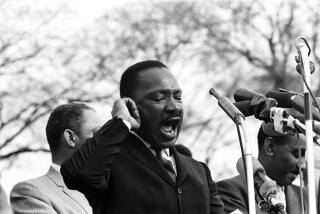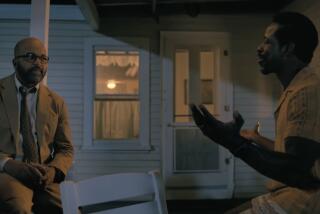Review: In the documentary ‘The King,’ Eugene Jarecki hits the road to explore byways branching from Elvis Presley to Trump’s America
At first glance, a documentary about Elvis Presley doesn’t feel like a natural subject for Eugene Jarecki. The director previously explored U.S. foreign policy in “Why We Fight” and the country’s war on drugs in “The House I Live In,” but “The King” isn’t your standard music documentary.
Instead, Jarecki casts the life of Presley — the most American of icons — as a model for the United States’ rise and decline, particularly in the era of Trump. It’s a combination as messy and unlikely as Elvis’ beloved sandwich of peanut butter, banana and bacon, but it will ultimately go down with just as much pleasure for Presley fans and those who align themselves politically with the director.
Jarecki’s film approaches the legend’s life chronologically, traveling between key places in Presley’s personal geography, beginning in his birthplace of Tupelo, Miss., and passing through cities like Memphis, Nashville, New York, Hollywood and Las Vegas. Rather than taking a more traditional mode of transportation, Jarecki uses Presley’s 1963 Rolls-Royce, inviting actors, musicians and everyday people along for the ride.
Personalities as varied as Ethan Hawke, David Simon and James Carville share their thoughts on Presley in the front seat with the director. Musical acts like M. Ward, EmiSunshine and the Rain and Stax Music Academy Singers crowd into the back seat to play and channel a bit of the King’s energy. Coupled with the conversation and music is footage of the 2016 election and its aftermath, setting up Presley’s life as prefiguring a century he never lived to see where celebrity, consumerism and capitalism drive the country.
Jarecki positions Presley as the epitome of the American dream, tracing his roots from a boy who grew up in poverty in a small town to become the biggest star in the world. But “The King” doesn’t — and couldn’t — end with Presley at his peak; we watch the decline of his health and performance, and the director frames the singer’s deterioration against how he sees the U.S. in the age of Trump.
Even before it reaches Presley’s final years, “The King” explores the icon’s challenges and the complex place he occupies in pop culture. There’s sadness and loneliness in a number of archival interviews with the star, and the film acknowledges some of his more questionable choices. Chuck D and Van Jones discuss the singer not only in the context of appropriation of black music but also his lack of political support for civil rights causes, creating a parallel with an America that doesn’t stand with people of color. Billie Holiday’s “Strange Fruit” plays over images of lynchings, demonstrating the real danger of remaining silent.
Historical tragedy mixes with contemporary chaos, interspersed with performance footage and interviews suffused with Presley’s trademark charisma, creating a disjointed experience. “What do you think I’m doing with this movie?” Jarecki asks Wayne Gerster, his road crew chief after the Rolls-Royce breaks down early in the film. “I don’t know what the hell you’re doing with this movie,” he replies. “I’m not sure you know what you’re doing. That’s what’s scary.”
The end result is sprawling and often unfocused, with a reach that exceeds its grasp. Like any road trip worth taking, “The King” wanders off the path, taking side journeys that don’t feel necessary in reaching the final destination. Jarecki’s documentary won’t please those who would prefer a typical biography — or those who disagree with his central political premise — but it’s an interesting if flawed look at a legend and his country.
-------------
‘The King’
Rated: R, for language, some disturbing images and brief drug use
Running time: 1 hour, 47 minutes
Playing: Landmark Nuart Theater, West Los Angeles
See the most-read stories in Entertainment this hour »
Movie Trailers
More to Read
Only good movies
Get the Indie Focus newsletter, Mark Olsen's weekly guide to the world of cinema.
You may occasionally receive promotional content from the Los Angeles Times.










